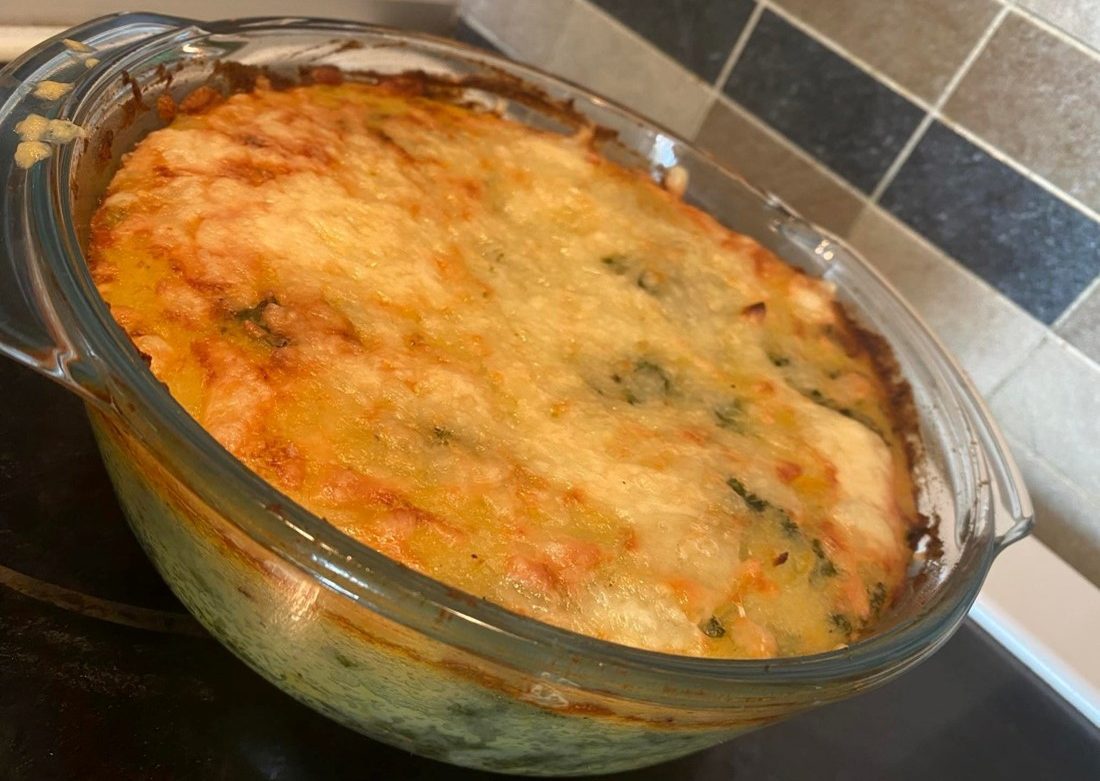Rumbledethumps is a traditional Scottish recipe, similar to bubble and squeak but cooked in an oven dish rather than a pan. It’s perfect for a cold afternoon snack. It is low-cost and easy to make, and you can also prepare it in advance. This recipe has been adapted to eliminate frying, and steamed kale has been used instead of cabbage to increase calcium intake and fibre. It can be further adapted depending on special dietary needs.
Serves: 6
Dietary: suitable for vegetarian, vegan, lactose-free, coeliac
May Contain: Soya (dairy-free spread)
Preparation time: 30 minutes
Cooking time: 1 hour and 5 minutes
INGREDIENTS
3 ½ cups (500 g) potatoes, peeled and diced into 1 cm cubes
1 medium (275 g) swede, peeled and diced into 1 cm cubes
1/3 cup (75 g) dairy-free spread
3¾ cups (250 g) kale, thinly sliced
2 cm (25 g) dairy-free cheese
Pepper
METHOD
- Preheat the oven to 350oF/180oC/160oC fan/Gas Mark 4.
- Boil or steam the potatoes and swede until soft (20 minutes), then mash them together in a large bowl.
- Steam the kale until soft (5 minutes). Alternatively, place a drainer on a saucepan with boiling water and place the kale in the drainer.
- Add the kale to the potato and swede and mix thoroughly; add the diary-free spread as you do so, and season with pepper to taste.
- Place the mashed vegetables in an oven-proof baking tray or ramekins and sprinkle the cheese on top; cover with foil and bake in the oven for about 30 – 40 minutes or until heated right through.
- Remove the foil and cook for a further 5 mins or until golden brown on the top.
This recipe has been donated by Clare Atkins, a Student Nutritionist at the University of Hertfordshire.
NUTRITION INFORMATION
Per serving: (160 g)
Total calories: 189 kcal
Fat: 10.0 g
Saturated Fat: 2.0 g
Carbohydrate: 18.0 g
Total sugar: 3.5 g
Fibre: 4.3 g
Protein: 4.1g
Salt: 0.22 g
NUTRITION FACTS
- Excellent source of Vitamins K and C. Vitamin C contributes to the normal function of the immune system. Vitamin K contributes to normal blood clotting.
- Did you this recipe is a good source of potassium and chloride? Chloride contributes to normal digestion by the production of hydrochloric acid in the stomach and contributes to normal muscle function.
- This recipe is also a good source of Vitamin A, Vitamin E, and B12
- Fibre content could be increased using unpeeled new potatoes.
- Typical recipe uses cabbage fried in butter, which would increase fat content; this recipe benefits from steaming the vegetable instead.
- Kale is used here as higher calcium content to benefit milk-free status.
VARIATIONS
- Frozen vegetables could be used to reduce cost, i.e., kale and swede could be swapped for frozen carrot and frozen swede or even frozen butternut squash.
- If allergic to soya but not dairy, use dairy blended butter spread and cheese.
Consumer tested by Sylwia Szkup, Student Nutritionist at the Atlantic Technological University
Checked by Kathy Lewis. R.Nutr.,
© 2022 The Caroline Walker Trust

